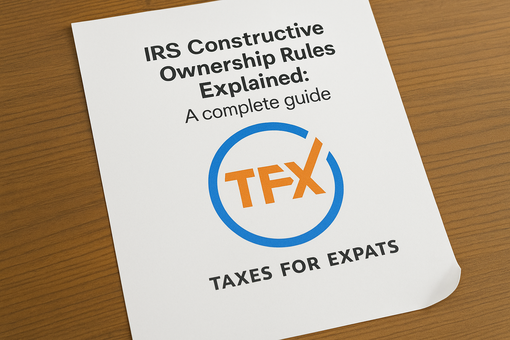Tax guide for Americans in Germany

Germany’s tax system can seem overwhelming at first. There are types of taxes you knew existed, and specific requirements which differ from what you’re used to as a US citizen/resident. Thrown in your tax obligations to Uncle Sam, and it’s a bit of a pickle.
But it doesn’t have to be. We’ve put together this guide to help you navigate taxes in Germany as a US expat. We’ll break down residency rules, taxes’ types for individuals and businesses, when and how to file — and more.
This article is brought to you by Taxes for Expats (TFX) – a top-rated tax firm serving US citizens, residents, and anyone with US tax obligations, both at home and abroad. Living in Germany and need help with your US taxes? Schedule your free discovery call, and we’ll review your case and walk you through the next steps.
Overview of Germany’s tax landscape
| Primary tax form for residents | German individual tax return (Einkommensteuererklärung). |
| Tax year | January 1 – December 31 |
| Tax due date | July 31 (extensions possible with a tax advisor). |
| Criteria for tax residency | Reside in Germany or spend more than 183 days a year in Germany. |
| US tax filing requirements | Must file Form 1040 and report worldwide income. |
| Eligibility for FEIE | Qualify under the physical presence or bona fide residence test. |
| Methods of Double Tax Relief | Through the tax treaty between the US and Germany and foreign tax credits. |
| Tax residency for dual citizens | Subject to both US and German tax, but the treaty prevents double taxation. |
| Estate and inheritance tax | Germany has an inheritance tax and US estate tax may also apply. |
| Overview of local tax rates | Progressive rates up to 45% plus solidarity surcharge. |
Do US expats need to file for taxes in Germany?
By default they need to. However, if your only stream of income is employee wages, then you don’t need to file an individual tax return — taxes will be withheld automatically, the money you’ll get will be after-tax.
But if you:
- Are self-employed
- Receive multiple income streams
- Benefit from foreign assets
… then you have to file a tax return according to German tax laws. That is, after determining whether you qualify as a resident or a non-resident.
Resident vs. non-resident of Germany
When preparing for US taxes while living in Germany, it's important to determine whether you are classified as a resident or non-resident of Germany. This classification directly affects how much tax you'll owe - both in Germany and the US - as well as the types of deductions and exclusions available to you as an expat.
German residency can affect your obligations because residents are taxed on worldwide income, while non-residents are taxed only on German-sourced income. Seek advice from a local tax professional in Germany if you're unsure about your tax status.
Who can be considered a resident of Germany?
Under German tax law, you are generally considered a resident if you meet one of the following criteria:
- Physical presence. You spend more than 183 days in Germany in a calendar year. This is an easy way to establish residency, especially for expats working or living in the country long-term.
- Permanent residence. You maintain a home or residence in Germany that is available to you for an extended period, even if you're not physically present every day. This can include rented or owned property.
- Intent to stay. The German authorities may also assess your intention to stay, which can be determined by various factors, such as a long-term employment contract or family ties in Germany.
What types of taxes are there in Germany?
Germany has a multi-tiered tax system with several types of taxes affecting individuals, including income tax and value-added tax.
Personal income tax
Income tax is just what it says on the tin: income you receive is taxable. Here’s which types of income are considered personal:
- Wages
- Salary
- Trade or business
- Rental
- Investment
- Services rendered
- Royalties
- Alimony, annuities
2025 German income tax rates
Income tax rates in Germany are progressive, meaning they increase as your income increases. For 2024, the tax rates are as follows:
| Taxable income range for single taxpayers (EUR) | Taxable income range for married taxpayers (EUR) | Tax rate (%) |
|---|---|---|
| 0 - 11,604 | 0 - 23,208 | 0 |
| 11,604 - 66,760 | 23,208 - 133,520 | 14 to 42* |
| 66,760 - 277,825 | 133,520 - 555,650 | 42 |
| 277,825 and above | 555,650 and above | 45 |
*Geometric progressive rates start at 14% and increase to 42%.
Solidarity surcharge
Originally introduced to help with the costs of reunification, this 5.5% surcharge applies to high-income earners on top of income tax, but it's mostly phased out for lower- and middle-income earners.
Value-added tax
German VAT (Umsatzsteuer) generally stands at 19%. However, essentials like food, books, and public transportation are taxed at 7%.
Expat entrepreneurs and freelancers who bill clients in Germany should factor VAT into their services. It won’t show up on your income tax forms, but it should be part of your pricing strategy.
Property tax
Germany levies an annual property tax (Grundsteuer) on property owners, which is based on the assessed value of the property and varies by municipality. Rates typically range from 0.26% to 1%, with higher rates often seen in bustling urban areas.
For example, if you own a €500,000 home in Munich, you could pay between €1,300 and €5,000 annually, depending on the local rate.
For expats, this tax is an ongoing expense that must be planned for. However, US expats may be able to deduct this cost when filing their US tax return if the property is classified as an investment.
Inheritance and gift tax
Inheritance and gift tax (Erbschaftsteuer und Schenkungsteuer) in Germany applies to both residents and non-residents who inherit assets in Germany. Tax rates vary widely depending on the relationship between the donor and the recipient:
- Spouses and children. Tax rates for close family members range from 7% to 30%, with higher rates for larger inheritances. Exemptions include €500,000 for spouses and €400,000 for children.
- Other Relatives and Unrelated Persons. Rates for distant relatives or unrelated beneficiaries range from 15% to 50%, with smaller exemptions.
Church tax
Church tax (Kirchensteuer) is unique to Germany and applies to individuals registered with certain religious organizations. It is usually 8-9% of your income tax liability, although the exact rate varies from one land to another. However, expats can avoid this tax by formally deregistering from the church if they are not practicing members.
Church tax is automatically deducted for those who are registered, so expats must update their registration status with local authorities if they wish to avoid this additional expense. This tax may also affect US tax returns, as it may qualify as a deductible foreign tax.
Dog tax
In Germany, even your furry friend has a tax bill - the dog tax (Hundesteuer)! TThe municipal fee typically ranges from $90 to $200 for the first pup. Fees increase with each additional dog, and certain high-energy breeds can cost even more.
For expats, this quirky expense is something to keep in mind when bringing your four-legged friends. Pet registration is required, and skipping the dog tax could result in fines from local authorities.
Estate tax
The German estate tax is similar to the inheritance tax and applies to assets transferred after death. The tax rate and exemptions vary depending on the relationship between the decedent and the beneficiary.
Real estate transfer tax
In Germany, real estate purchases are subject to a land transfer tax (Grunderwerbsteuer). This tax, which is payable by the buyer, varies from land to land, with rates ranging from 3.5% to 6.5% of the property's sale price. Rates in major cities and states, such as Berlin and Hamburg, tend to be on the higher end of this spectrum.
For expats buying property in Germany, the land transfer tax is a one-time expense added to the purchase price of the property. This tax is not deductible for US tax purposes.
Capital gains tax
Capital gains tax (Kapitalerträge) in Germany applies to gains from the sale of certain assets, such as stocks, bonds, and real estate, although different rules apply to each type of asset.
- Stocks and securities. Capital gains from the sale of stocks and securities are subject to a flat 25% tax, plus a 5.5% solidarity surcharge. This results in an effective rate of approximately 26.4% for most investors. Notably, an exemption applies to annual capital gains under €801 for singles and €1,602 for married couples.
- Real estate. Gains from the sale of property held for more than 10 years are exempt from capital gains tax. However, if the property is sold within 10 years of purchase, gains are fully taxable, which can be significant for expats with property investments in Germany.
The IRS may still tax certain foreign capital gains after applying for appropriate exclusions or credits.
Trade income tax
Trade tax (Gewerbesteuer) applies to businesses operating in Germany. This tax is levied at the municipal level, which means that rates vary depending on the location of the business. In general, rates range from 7% to 17%, with higher rates often found in large urban centers.
The business tax base is determined by calculating taxable income, with a standard deduction of €24,500 for unincorporated businesses. The resulting income is then multiplied by a municipal rate (Hebesatz), which varies by location.
Corporations are fully subject to business tax on their income, while sole proprietors and partnerships can deduct a portion of the business tax from their income tax liability.
For US expats owning or operating businesses in Germany, this tax structure means a potentially higher overall tax liability.
The tax is not directly deductible on a US tax return but can be taken into account when calculating foreign tax credits.

Tax rate in Germany compared to the US
To give you a better idea of how high German tax rates can be, here's a comparison chart that highlights the key differences in tax rates and structures between Germany and the US:
| Tax category | Germany | United States |
|---|---|---|
| Personal income tax | Progressive rates from 0% to 45% | Progressive rates from 10% to 37% |
| Solidarity surcharge | 5.5% on income tax for high earners | Not applicable |
| Church tax | 8%–9% of income tax (for registered members) | Not applicable |
| Capital gains tax | 25% on most capital gains, plus solidarity surcharge | 0%–20%, depending on income level |
| Estate tax | 7%–50% depending on relationship and amount | 18%–40%, based on estate value |
| Property tax | Varies by municipality (0.26%–1%) | Varies by state (average around 1.1%) |
| Real estate transfer tax | 3.5%–6.5% depending on location | Varies by state, often around 1% |
| Value-added tax | 19% standard; 7% reduced rate | Sales tax, varies by state (0%–10%) |
Filing income tax returns
Below we’ll explain when and how you need to file your tax return, break down the penalties for incorrect filing — and how Germany’s taxation rules dovetail with the US rules.
When to file tax returns
The standard deadline for filing tax returns is July 31 of the following year. However, if a certified tax advisor prepares the return, the deadline is extended to February 28 of the year after that.
US expats should remember that the IRS also has deadlines for filing US taxes abroad. The typical deadline for US federal taxes is April 15, but expats receive an automatic extension until June 15. Additional extensions may be available upon request until October 15.
How to file a tax return
You can file your tax return in Germany:
- Online via ELSTER. The German tax authorities provide an online platform, ELSTER, for filing income tax returns. However, the registration for it may take several weeks, so set up an account well before the filing deadline.
- Through a tax accountant. Many expats choose to work with a tax accountant due to the complexity of the German tax system. An accountant can help optimize deductions, overcome language barriers, and ensure compliance with both German and US tax regulations.
- Paper filing. Paper returns can also be filed, although this method is slower and not as widespread. Paper forms are available at the local tax offices.
Penalties for late or incorrect filing
Germany enforces strict penalties for late or inaccurate filings:
- Late filing penalty. Failure to meet the July 31 deadline may result in a late filing penalty of 0.25% of the tax due per month, with a minimum of €25 per month. Expats using a tax advisor can avoid this penalty if the advisor's extended deadline is met.
- Interest on unpaid taxes. In addition to late filing penalties, unpaid taxes are subject to interest at the rate of 0.5% per month (6% per year) from the filing deadline until the amount is paid.
- Penalties for improper filing. Fines and penalties may also be imposed for false or fraudulent information. The amount of the penalty depends on the nature and severity of the errors, with intentional misrepresentations subject to criminal prosecution and possible fines.
Social security in Germany
Germany's social security system is comprehensive and includes health insurance (Krankenversicherung), pension insurance (Rentenversicherung), unemployment insurance (Arbeitslosenversicherung) and long-term care insurance (Pflegeversicherung). Expats working in Germany are usually required to participate in this system, with contributions being automatically deducted from their wages.
- Social Security contributions are split between employees and employers. The total contribution rate is approximately 40% of an employee's gross salary, with half paid by the employee and half by the employer. Specific rates vary slightly for different types of insurance, such as pension and health insurance.
- In order to avoid double social security taxation, the US and Germany have a totalization agreement. This allows expats to contribute to only one country's system if certain criteria are met. Expats working temporarily in Germany can apply for an exemption from German social security contributions, allowing them to remain in the US system.
Deductions and credits for expats in Germany
US expats in Germany can rely on different deductions and credits to bring down the amount of tax they owe in both countries. These include:
- Foreign Earned Income Exclusion. The FEIE allows qualifying expats to exclude up to $126,500 (2024 limit) of foreign-earned income from US taxation. To qualify, expats must meet either the Physical Presence Test (330 days in a 12-month period) or the Bona Fide Residence Test. Before filing, run your numbers with our FEIE calculator for expats to verify day counts and your expected exclusion amount.
- Foreign Tax Credit. The FTC can be used to bring down the taxable amount to the US. This credit is particularly beneficial for those with income above the FEIE threshold.
- Housing exclusion or deduction. Expats paying for housing in Germany may qualify for a housing exclusion or deduction on their US tax return.

The tax treaty between the US and Germany
The tax treaty between the United States and Germany is designed to prevent double taxation for individuals and corporations operating in both countries. The treaty determines which country has primary taxing rights on various types of income, helping expats avoid paying taxes twice on the same income.
Key elements of the treaty include:
- Allocation of taxing rights. The treaty outlines the types of income that Germany or the US has the primary right to tax. For example, most employment income earned in Germany is taxable only in Germany, while US source income may remain taxable in the US
- Taxation of pensions. The treaty determines which country has the right to tax pension income, generally allowing only one country to tax such income based on the retiree's residence. This is particularly beneficial for retired expats who wish to avoid double taxation on their pensions.
- Relief from Double Taxation. By taking advantage of the treaty, US expats can claim foreign tax credits on their US tax returns, reducing or eliminating their US tax liability for income already taxed in Germany.
Most popular tax forms for US expats
US expats living in Germany must file various tax forms to comply with both US and German regulations. The most common forms are:
- Form 1040. The US individual income tax return is required for all US citizens, regardless of residency. Expats in Germany file Form 1040 and report their worldwide income. To reduce their tax liability, expats can attach additional forms, such as the Foreign Earned Income Exclusion or Foreign Tax Credit.
- Form 2555. Used to claim the Foreign Earned Income Exclusion (FEIE), this form allows expats to exclude up to $126,500 of foreign-earned income from US taxation. Eligibility is determined by meeting the physical presence or bona fide residence test.
- Form 1116. For expats who choose the Foreign Tax Credit (FTC) instead of the FEIE, Form 1116 allows them to claim a dollar-for-dollar credit against US taxes for income taxes paid to Germany. This is useful for those whose income exceeds the FEIE threshold or who have passive (e.g. investment) income.
- FBAR (FinCEN Form 114). US expats with foreign bank accounts that total more than $10,000 during the calendar year must file the Foreign Bank Account Report (FBAR).
- Form 8938 (FATCA). Under the Foreign Account Tax Compliance Act, expats with significant foreign financial assets may be required to file Form 8938 — if the total amount of these assets exceed certain thresholds. While similar to the FBAR, this form is filed with the IRS along with the expat's tax return.
German tax forms for US expats
US expats living and working in Germany are required to file several local tax forms to comply with German tax authorities. These forms ensure that income, deductions, and other financial details are properly reported:
- Einkommensteuererklärung. This is the main German income tax return form. Expats earning income in Germany must file this annually with their local tax office. The form includes sections for reporting wages, self-employment income, capital gains, and deductions.
- Schedule N (Employment Income). If you're an employee in Germany, this supplemental form reports earned income. Expats should include details such as salary, bonuses, and employer-provided benefits.
- Anlage AUS (Foreign Income). For income earned outside of Germany, Anlage AUS is used to report foreign income. This form is essential for expats who continue to have income from US sources, as it helps determine the potential for German tax credits on foreign income.
- Anlage KAP (Capital Gains). Expats with investment income, such as dividends or interest, must file the KAP form. It covers capital gains, and German tax authorities may assess tax based on the specified rates for investment income.
Living expenses for US expatriates in Germany
Aside from understanding your tax obligations, you need to be aware of the living expenses in Germany. These costs can vary significantly depending on the city and lifestyle.
Large cities such as Berlin, Munich, and Frankfurt generally have a higher cost of living compared to smaller towns. Typical living costs in Germany include rent, utilities, transportation, food, health insurance, and entertainment.
Simplify your tax filing — get professional assistance!
We covered the main aspects of living in Germany as a US expat. However, navigating the tax landscape on your own might still appear daunting. Don’t worry: we are ready to take that weight off your shoulders. At Taxes for Expats, we have been making life easier for US expats around the globe for 25 years. We cover 190+ countries and have lent a hand to 50,000+ clients.

FAQ
Yes, as a US citizen or resident, you are required to file a US tax return each year, regardless of where you live. If you qualify as a German tax resident, you're also required to file a German tax return. However, tax credits and the US-German tax treaty help reduce or eliminate double taxation.
Failure to file a required tax return in Germany can result in penalties and interest on any unpaid taxes. Germany enforces late filing penalties that can add up quickly. Working with a tax professional will ensure compliance and minimize the risk of penalties.
The Foreign Tax Credit allows you to offset your US tax liability by claiming a credit for income taxes paid to Germany. It's especially useful if your German tax liability exceeds the Foreign Earned Income Exclusion limit, as it helps prevent double taxation.
The US-German tax treaty determines which country has the right to tax retirement income. Generally, US-sourced annuities can remain taxable only in the US, but it's wise to check with a tax advisor, as treaty benefits may vary depending on the type of retirement account.
Yes, medical insurance is mandatory. Expats are required to enroll in either the public health insurance system or a private health insurance plan, depending on eligibility. Contributions are usually shared with the employer.
FBAR and FATCA reporting include foreign financial accounts such as bank accounts (checking, savings), foreign brokerage accounts, mutual funds, pensions, and certain foreign insurance policies. FBAR applies if the combined balance exceeds $10,000, while FATCA has higher thresholds for reporting - and these are not limited to just accounts, instead they cover all your foreign assets..
US-based accounts and assets, such as domestic bank accounts, US brokerage accounts, 401(k)s, IRAs, and direct US real estate, are exempt from FBAR and FATCA. Generally, only foreign accounts and assets managed abroad are reportable.
For FATCA compliance, German banks identify US clients by checking for US indicators (e.g., US address or place of birth), request forms such as W-9 or W-8BEN, and report relevant accounts to German authorities, who then share the data with the IRS. This process helps track the foreign assets of US citizens.


